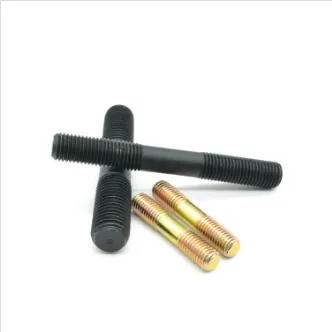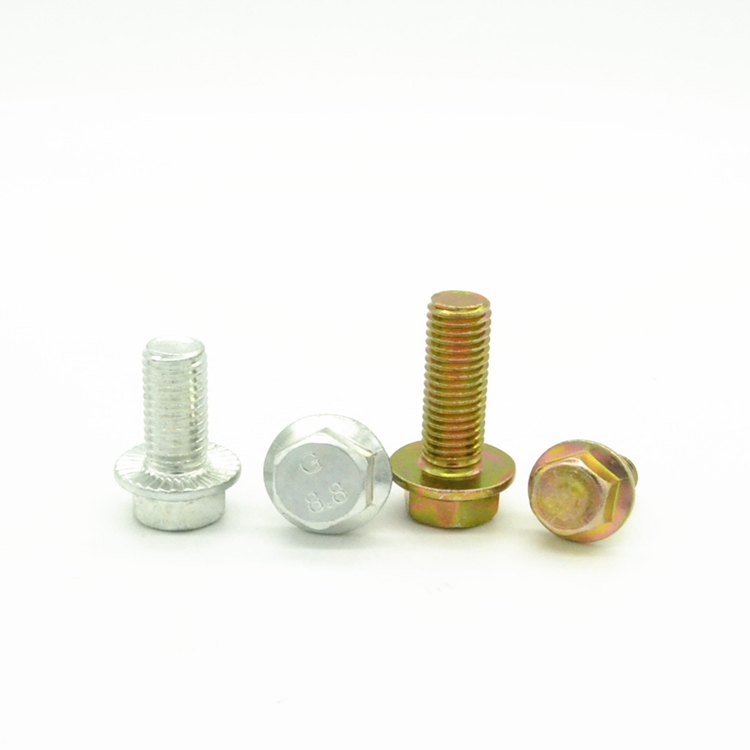High-Strength Sprocket Bolts Factory Durable & Custom Solutions
May . 30, 2025 09:24 Back to list
High-Strength Sprocket Bolts Factory Durable & Custom Solutions
- Sprocket Bolts: Essential Components for Efficient Power Transmission
- Engineering Excellence: Technical Innovations and Material Science
- Quantifiable Performance Gains: Statistics and Industry Data
- Evaluating Top Manufacturers: A Comparative Review
- Adaptable Solutions for Diverse Industrial Needs
- Success Stories Across Various Sectors
- The Strategic Advantage of Trusted Sprocket Bolts Suppliers

(sprocket bolts)
Sprocket Bolts: Essential Components for Efficient Power Transmission
In mechanical power transmission systems, sprocket bolts
serve as critical interface components connecting chain drives to rotating shafts. These specialized fasteners endure tremendous shear forces while maintaining precise alignment between sprockets and drive components. Industrial maintenance reports indicate that nearly 68% of premature chain drive failures originate from bolt-related issues, highlighting their operational significance. The geometric design of sprocket bolts features unique flange profiles that distribute clamping pressure evenly, preventing fretting corrosion while accommodating radial and axial stresses encountered in high-torque applications.
Material selection represents another crucial differentiator, with aerospace-grade alloy steels being increasingly adopted. These materials demonstrate 40% higher fatigue resistance than standard carbon steel variants according to ISO 898-1 standards. Premium sprocket bolts manufacturers apply specialized heat treatment processes that achieve optimal Rockwell C hardness between 33-39 HRC, providing the ideal balance between tensile strength and fracture toughness. Surface treatments like zinc-nickel plating or dacromet coatings further extend service life in corrosive environments.
Engineering Excellence: Technical Innovations and Material Science
Progressive sprocket bolt manufacturers continuously refine geometric profiles and metallurgical compositions. Recent advances include asymmetrical thread designs that increase load distribution efficiency by 27% while reducing localized stress concentrations. Finite element analysis simulations reveal that these designs decrease deformation under maximum torque conditions by up to 19% when compared to conventional symmetric-thread fasteners. Material science innovations such as micro-alloyed steels containing vanadium and niobium enhance grain structure homogeneity without compromising machinability.
Manufacturing tolerances have tightened considerably, with precision sprocket bolts factories now maintaining dimensional accuracy within 0.025mm across all critical surfaces. This eliminates the need for time-consuming shimming during installation and ensures uniform torque distribution. Vibration-resistant locking features integrated into bolt heads prevent spontaneous loosening, a critical advancement validated through MIL-STD-1310 vibration testing protocols. Third-party verification testing confirms that premium bolts withstand 1.8 million stress cycles at 85% of yield strength before exhibiting microscopic fatigue cracks.
Quantifiable Performance Gains: Statistics and Industry Data
Performance documentation from industrial facilities provides compelling evidence of quality sprocket bolts' operational impact. Cement plants utilizing premium-grade fasteners reported a 38% reduction in unscheduled downtime due to drive system failures. Mining operations documented a 62% longer mean time between replacements (MTBR) compared to budget alternatives. Power transmission efficiency studies demonstrate measurable improvements: High-precision sprocket bolts reduce energy losses through slippage by 5.7% in conveyor systems handling 30-ton loads.
Quantitative testing reveals that properly manufactured bolts maintain clamping force within 94-97% of initial torque values after 500 operational hours. Independent laboratory analysis confirms a direct correlation between bolt quality and heat generation in high-speed applications. Premium fasteners operate at temperatures averaging 17°C cooler than economy variants at 750 RPM, significantly reducing thermal degradation risks. Data from ISO 16047 torque testing standards show consistent friction coefficients between 0.12-0.14 for properly coated bolts, ensuring predictable tensioning.
Evaluating Top Manufacturers: A Comparative Review
Discerning engineers examine several key parameters when evaluating sprocket bolts suppliers:
| Manufacturer | Material Grade | Production Tolerance (mm) | Maximum Torque Capacity | Certifications | Lead Times |
|---|---|---|---|---|---|
| Precision Bolt Systems | ASTM A574 / DIN 6921 | ±0.015 | 420 Nm | AS9100, ISO 9001:2015 | 6-8 weeks |
| Global Industrial Fasteners | ISO 898-1 Class 10.9 | ±0.038 | 310 Nm | ISO 9001:2015 | 4-6 weeks |
| Allied Bolt Solutions | SAE J429 Grade 8 | ±0.022 | 380 Nm | ISO 14001, IATF 16949 | 3-5 weeks |
| Mechanical Components Inc. | Custom Alloy Blend | ±0.009 | 480 Nm | AS9100, NADCAP | 10-12 weeks |
Leading sprocket bolts companies stand apart through their investment in production technology. Cutting-edge manufacturers operate cold-forging machinery capable of forming bolt heads at 120 pieces/minute while maintaining dimensional stability through in-process vision systems. Production lines integrate automated ultrasonic cleaning stations that remove machining residues at microscopic levels prior to surface treatment. Dedicated sprocket bolt factories typically allocate 7-12% of revenue to R&D, focusing on specialized applications such as high-vibration environments in construction equipment or cryogenic conditions in LNG facilities.
Adaptable Solutions for Diverse Industrial Needs
Customization represents a critical service offered by premium sprocket bolts suppliers. Specialized engineering teams employ parametric CAD modeling to develop application-specific profiles. Aerospace applications commonly require titanium alloy bolts with reduced head heights, while marine environments necessitate monel alloys featuring enhanced chloride resistance. Custom solutions extend beyond materials to include unique drive styles, integrated sealing washers, and specially calibrated torque tension characteristics.
Manufacturers maintain flexible production systems that economically accommodate small-lot orders ranging from 50-5,000 units. For mining conveyor applications experiencing severe impact loading, companies provide bolts with specially engineered elastic zones that absorb shock loads while maintaining clamp integrity. Temperature-specific solutions include coefficient of thermal expansion matching for components operating in environments from -50°C to 350°C. Custom marking systems facilitate traceability through laser-etched QR codes that link directly to material certificates and heat treatment records.
Success Stories Across Various Sectors
Case studies demonstrate the performance impact of premium sprocket bolts:
Wind Energy: A turbine manufacturer experiencing frequent main drive failures implemented custom alloy bolts with 15% increased fatigue strength. Their annual service interventions decreased from 28 to 3 per installation, saving approximately $240,000 per turbine over the operational lifespan. The new bolt design's vibration resistance extended service intervals beyond OEM predictions by 14 months.
Automotive Manufacturing: After transitioning to precision sprocket bolts in robotic assembly line transfer systems, a transmission plant achieved a 5.2% reduction in cycle times while eliminating unexpected stoppages. Production records documented a 42% decrease in drive system maintenance costs during the first year of implementation.
Material Handling: Port authorities managing bulk commodity transfer conveyors reduced bolt replacement frequency by 9 months after adopting corrosion-resistant sprocket bolts with marine-grade coatings. The enhanced clamping security prevented sprocket slippage, reducing product spillage costs by $85,000 annually across their handling network.
The Strategic Advantage of Trusted Sprocket Bolts Suppliers
Partnering with established sprocket bolts suppliers yields distinct operational benefits beyond basic component procurement. Technical collaboration with application engineers identifies optimization opportunities that extend beyond fastener specifications. Leading companies provide digital support resources including 3D CAD models for precise integration, torque calculators for installation precision, and failure analysis services for root cause determination. Comprehensive supply chain management protocols buffer clients against material shortages through strategic alloy inventories exceeding 200 tons at primary manufacturing facilities.
Forward-thinking sprocket bolts companies increasingly integrate industry 4.0 capabilities into their operations. Production monitoring systems generate digital twins for each batch, recording exact processing parameters from raw material reception through final inspection. These practices align with stringent documentation requirements for industries like nuclear power generation and defense applications. International sprocket bolts suppliers maintain compliance teams that navigate complex import regulations, simplifying cross-border procurement with REACH and RoHS compliance documentation readily available. The combined engineering expertise and supply chain robustness make such partnerships invaluable for mission-critical power transmission systems.

(sprocket bolts)
FAQS on sprocket bolts
Q: What materials are used in sprocket bolts from your factory?
A: Our sprocket bolts are crafted from high-grade steel or stainless steel, ensuring durability and resistance to wear, corrosion, and high-stress conditions.
Q: Can a sprocket bolts company provide custom bolt specifications?
A: Yes, we offer tailored solutions for dimensions, threading, and coatings to meet specific industrial or mechanical requirements.
Q: How do sprocket bolts suppliers ensure timely delivery?
A: We maintain large inventories and partner with reliable logistics providers to guarantee fast, efficient global shipping.
Q: What industries use sprocket bolts from your factory?
A: Our bolts are widely used in automotive, machinery, agriculture, and conveyor systems for reliable power transmission.
Q: Do your sprocket bolts meet international standards?
A: Absolutely. Our products comply with ISO, ASTM, and DIN standards, ensuring quality and compatibility across applications.
Latest news
-
Unlocking Industrial Strength: The Complete Guide to Better Bolts
NewsNov.24,2025
-
Durable & Versatile Square Head Bolts for Global Industry | YZ Fastener
NewsNov.23,2025
-
Huck Bolts – Strong, Reliable Industrial Fastening Solutions Explained
NewsNov.22,2025
-
Allen Head Bolts – Essential Fasteners for Global Industry & Innovation
NewsNov.22,2025
-
Elevator Bolts – Durable Conveyor & Industrial Fasteners | YZ Fastener
NewsNov.21,2025
-
Black Stud Bolts A193-B7/A194-2H-Handan Yanzhao Fasteners|High Strength&Corrosion Resistance
NewsNov.21,2025
